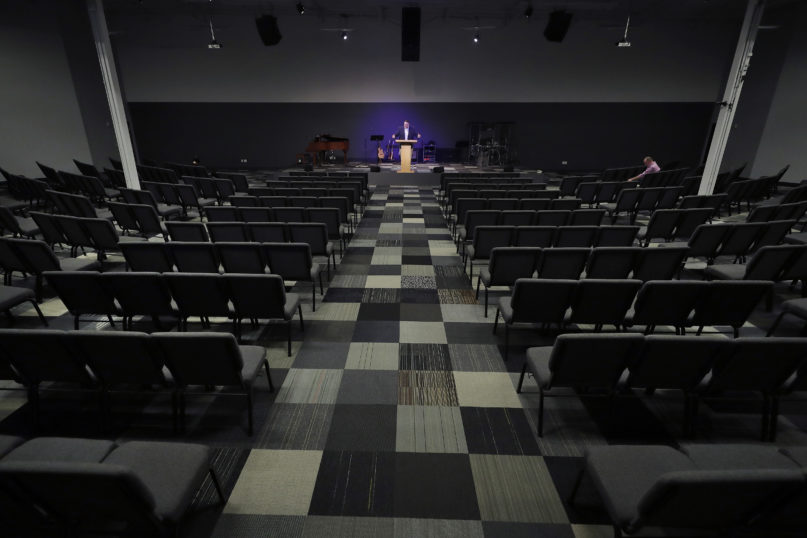Imagine when the COVID-19 crisis is all over.
On the day after this is all over, we will emerge from our homes, as if from caves. Our eyes will blink in the daylight.
On the day after this is all over, we will rush into the arms of our friends and even strangers.
On the day after this is all over, it will be like the end of World War Two. It will be like that iconic photograph of V-J Day in Times Square. On August 14, 1945, a Navy sailor embraced and kissed a stranger — a nurse. That is going to happen again.
Well, OK, maybe not — considering how times and mores have changed.
On the day after this is all over, toilet paper will be abundant. Purell will be scarce.
On the day after this is all over, we will start planning the memorial services for those who died during the pandemic — and not necessarily of the virus itself.
On the day after this is all over, we will willingly waltz from the virtual to the real.
On the day after this is all over, or within days of the day when it is all over, we will return to our bricks and mortar sanctuaries. The Shabbat evening synagogue service, Sunday morning church service, Muslim prayer meeting, Sikh worship experience, Quaker meeting, etc. — they will all be back.
Won’t they? And, won’t we be returning to our sacred spaces?
I say this, prayerfully — I hope so. Fervently.
Because, this is what I, and others, have discerned.
America, and the world, will look and feel a lot different.
What about our spiritual homes?
We are now entering Week 2 of cyber-services — through Facebook, Zoom, etc.
By the way: a word to my colleagues, and to myself. Ease up. Seriously. It seems as if everyone is falling over each other, competing to see how much online traction and audience you can gain. I see it in myself. I compare my Facebook figures with everyone else. It feels validating.
Oh, yes: follow us on Facebook — @TempleSolelHollywood — to watch services.
But that is the point, isn’t it? At what point does Facebook Faith become, well, passe? How long will it take for us to begin to find this all a little tedious and boring?
Is the Online House of God re-defining community? Is it re-defining what it means to participate in a worship service? Is it all becoming, in the words of my colleague, Rabbi Cookie Olshein of Temple Israel in West Palm Beach, “religutainment?”
Let us hope not. Let us recognize this time period for what it is — an interim moment in American spiritual and public life.
That is why I have written, and recite, this prayer for whenever my people and I gather together — virtually.
Al daat ha-makom v’al daat ha-kahal,
With the knowledge of the One Who is in All Places,
and with the knowledge of this holy community,
We declare with full voice and with full heart.
We are in the in-between moments.
We are in the in-between moment of being in our sacred spaces, our spaces that are the descendants of the ancient mishkan.
And our private spaces, in which some of us dwell alone, and in which some of us dwell with our closest others.
This is temporary – this isolation we feel – and may God heal our isolation; may God hear the anguished voices of those who are truly alone and lonely.
We commit ourselves anew: that once we through our wisdom are able to lift the veil of fear, we will redeem ourselves from our solitude, and re-join each other in sacred community,
That we will go from merely holding hearts, to once again holding hands,
That our embraces will journey back from the virtual to the real.
Even as our prayers and songs go out into the cloud, let us resolve:
In the words of Nehemiah: “We shall not abandon this house of God.”
Our houses of God and Israel and Torah are still our houses and still our homes.
They are here to sustain us and inspire us, to give shape to our lives, to give depth to our hopes, to give us water to quench our anguish.
We will return to them – nashuvah. And we promise to continue to sustain them, and to honor them for what they must continue to be.
This is temporary. Od yishama – yet again shall the voices of children and adults be heard in our sanctuaries. We will return.
Some footnotes.
- Al daat ha-makom….That is a reference to the introduction to the Kol Nidre prayer on the eve of Yom Kippur. Makom usually means “place,” but here it is one of the names of God. God is Makom — the place of the world, the one who is in all places.
- The mishkan was the portable sanctuary that the Israelites carried on their journeys through the wilderness.
- “Even as our prayers and songs go into the cloud…” Double-entendre alert. The cloud is, of course, the cyber-cloud. The cloud is also a biblical euphemism for the presence of God.
- Nehemiah was one of the leaders of the Judeans who returned to the land of Israel at the end of the Babylonian Exile. So, too, we will return to our sacred places.
- “Od yishama….” “Yet again, it shall be heard….” A quote from the prophet Jeremiah, prophesying that the streets of Jerusalem would again be filled with laughter and song. It is now part of the seventh blessing in the sheva berachot, the seven wedding blessings.
So it will be for us. We will return.
Whoever you are, dear reader; wherever you are; whatever faith or un-faith or questioned faith you are — I am thinking of you.






